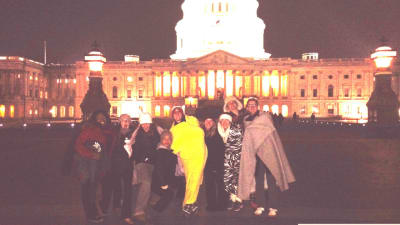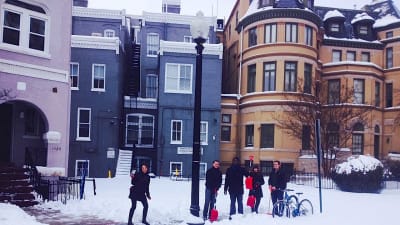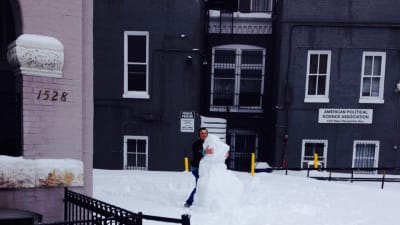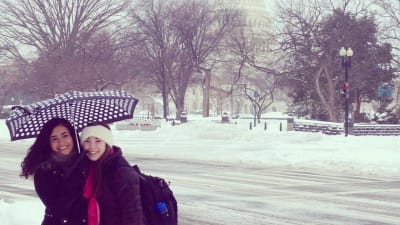“SEGLIFE”: CONFRONTING GENOCIDE, ENJOYING DC SNOWSTORM
Part of the SEGL experience (or, in the language of Twitter hashtags, #seglife) is learning to balance weighty issues with good fun. Last week was a perfect example of how our students blend both elements into a meaningful experience.
“Ghosts of Rwanda Night.” It is an SEGL tradition. Since our very first semester, students have watched the PBS Frontline documentary “Ghosts of Rwanda” on our first or second Friday evening. The film, which vividly documents one of the darkest chapters of our times, is challenging, sobering, upsetting, and–ultimately–inspiring. And the questions it provokes (particularly on a day when the UN released a frightening report on human rights abuses in North Korea) are profound.**
How do we recognize and prevent mass atrocities? How should we respond, individually and as a nation state? When should you follow authority, and when should you question or act against authority? When is it right to risk American lives? When is it right for the United States to intervene?

And so we watched the film, discussed it tearfully and angrily afterward, and began the third week at SEGL. On Saturday morning we spoke with one of the documentary’s key figures, Carl Wilkens. Wilkens, who was the only American to say in Rwanda during the genocide, has spoken with each SEGL class and won our “Golden Mug” award (given to the speaker our graduates believe has made the biggest difference in their lives). As a humanitarian aid worker, he saved hundreds of lives–particularly orphans in several orphanages around the capital city of Kigali.
Carl joined us by videoconference, answering nearly two hours of student questions. Some of the questions were about Rwanda and the genocide, but many more went even deeper.
Did you ever question your faith in the midst of the violence? What is your view of human nature? What do you think about forgiveness?
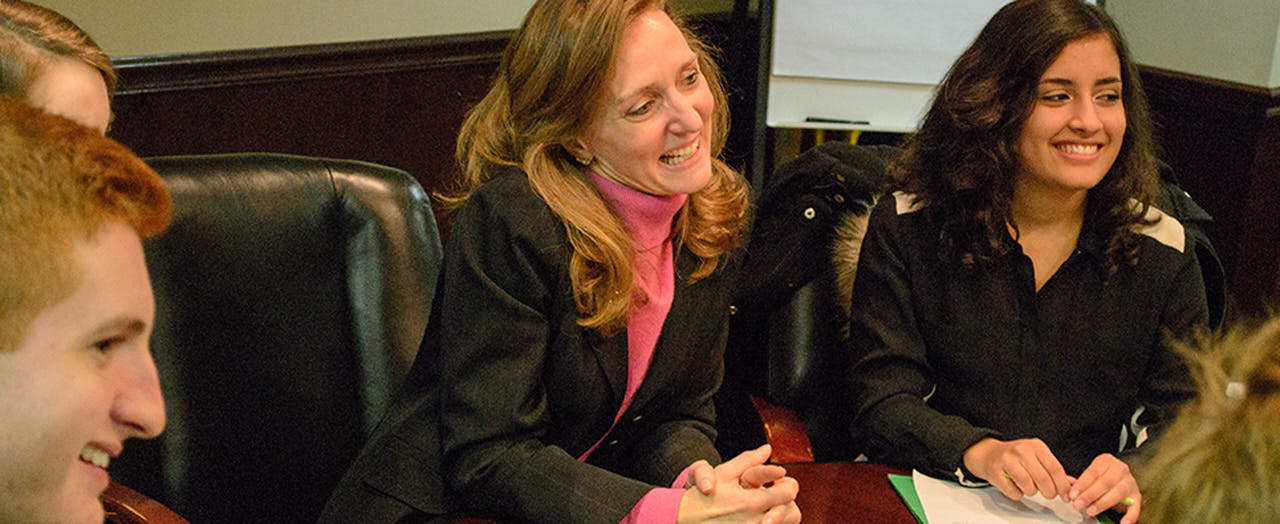
On Wednesday, we traveled to UPS’s DC headquarters to meet with Laura Lane, who currently serves as the company’s President of Global Public Affairs. In 1994, however, she was a young Foreign Service officer at the U.S. Embassy, responsible for evacuating each of the hundreds of Americans hoping to escape the genocide. She did so successfully, except for one person–Carl Wilkens–who refused to leave.
Lane spoke eloquently about her experiences (including naming hundreds of Rwandans “honorary Americans” so they could escape with the U.S. convoy out of the country) and her choice to follow orders and close the U.S. Embassy. Though many would call her actions heroic, her regret for not staying is still fresh, and she spoke poignantly to the students about following their own moral compasses, even when authority urges otherwise.

On Friday we traveled to the Rwandan Embassy to meet with Second Counselor Yvette Rugasaguhunga, a Tutsi survivor of the genocide. Rugasaguhunga was 14 when she lost four siblings, her father, and many others; she recounted her story in riveting detail and answered several student questions.
A special note: the Rwandan Ambassador to the United States, Professor Mathilde Mukantabana, has invited SEGL students to participate in a ceremony next week at the Embassy commemorating the 20th anniversary of the genocide. Interested students can light Urumuri Rutazima, “a flame that symbolizes remembrance as well as the resilience and courage of Rwandans.” (Click here to see the formal invitation–SEGL was the only high school invited.)
Our case study will likely continue later this semester, when we meet with Ambassador George Moose, who was Assistant Secretary of State for Africa during the genocide. Hearing more about the U.S. government’s discussions and decisions in 1994–and there are certainly good arguments for nonintervention–will no doubt help round out a meaningful set of experiences.

Meanwhile, last week saw the biggest dump of snow in DC–nearly a foot–since “Snowmaggedon” in 2010. We continued our SEGL tradition of never skipping classes for weather (in worse conditions we simply have classes in the dormitories, with stranded teachers videoconferencing in), and the students had great fun trudging through the elements while the rest of the city slept in. See below for a few pictures: you can see History class reenacting a Wizard of Oz-themed Populist parable (our cutout of British Labour leader Ed Miliband made the trip), a good-natured on-the-way-to-school snowball fight, some impromptu snowman building, and a few other shared moments.
#seglife, indeed!
This week: the Second Amendment.











